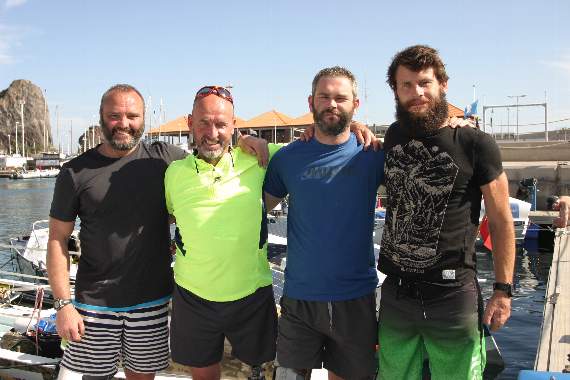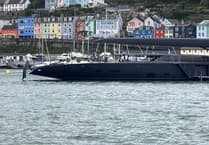AN all-amputee team led by injured ex-serviceman Cayle Royce from Dartmouth is on the starting line of the world’s toughest rowing race.
Strong southerly winds have delayed the start of the Talisker Whisky Atlantic Challenge until the weekend.
Lance Corporal Royce is among military veterans who makeup the Row2Recovery team who will be taking part in the six-week challenge from La Gomera in the Canary Islands to Antigua.
With him helping with preparations is Dartmouth rowing club stalwart and district councillor Hilary Bastone, who said temperatures were around 25C.
Sunday saw an official race leaving party when rowers, friends, family and race organisers took an evening to celebrate the efforts of the entire 2016 fleet and to wish them well.
There were successful rowers from past races and an announcement that the teams had already raised over €1.6m for charity before the race has even begun.
Race organiser Atlantic Campaigns has taken the decision to officially delay the race start due to imminent strong southerly winds.
If the rowers were to leave as planned on Tuesday it was considered there was a significant risk that they would be blown too far north.
This year, 29 crews have entered into the race but the other 28 are all able bodied.
Lance Corporal Royce, who took part in the 3,000-mile race two years ago, suffered serious injuries while serving in Afghanistan.
He underwent a double amputation and lost the fingers on his left hand following an explosion in Helmand while serving with the Brigade Reconnaissance Force.
Before leaving for the rowing challenge, he said he was relishing the prospect of skippering the all-amputee team. ‘Last time the challenge was the relentless weather and for week after week we endured driving rain, 60ft breaking waves and at one point around midnight the boat capsized and I was thrown overboard,’ he recalled.
‘That wasn’t funny, but I’ve warned the crew that the biggest challenge will be the endless boredom.’
Lance Corporal Royce said the race wasn’t just physically rigorous but was a mental game too.
‘The secret is to be patient,’ he said. ‘When the conditions are against you, wait, do nothing. When the conditions are good, work hard.
‘As military guys, working as a team is second nature to us and soldiers’ banter and good humour will get us through the tough times.
‘We’re trained to focus on the things that matter. A happy boat is a successful boat and we are a very happy, friendly crew.’
Renowned for its tough conditions, race participants typically row in two-hour shifts, with two-hour rest periods, for 24 hours a day.
Competitors burn around 8,000 calories daily and lose roughly 20 per cent of their body weight over the duration of the race.
Alongside physical exertion, the rowers will face huge waves, tropical storms, sleep deprivation, sweltering heat and the psychological challenges of living and working in a turbulent natural environment.




